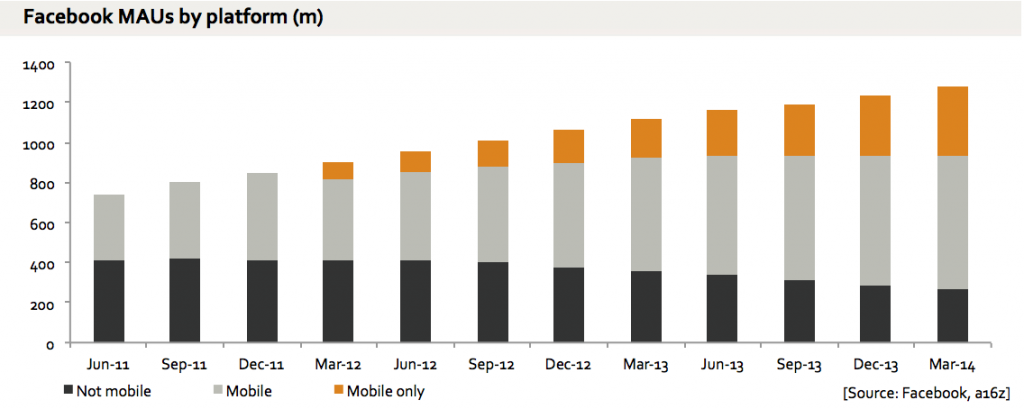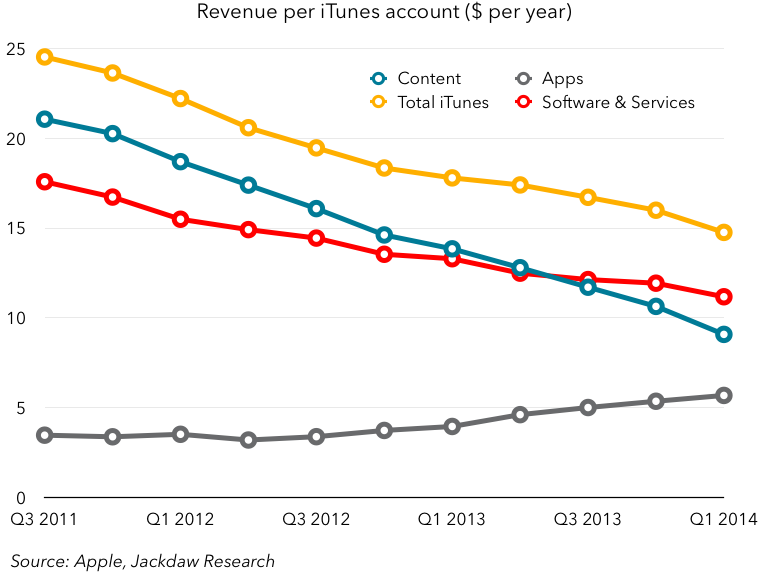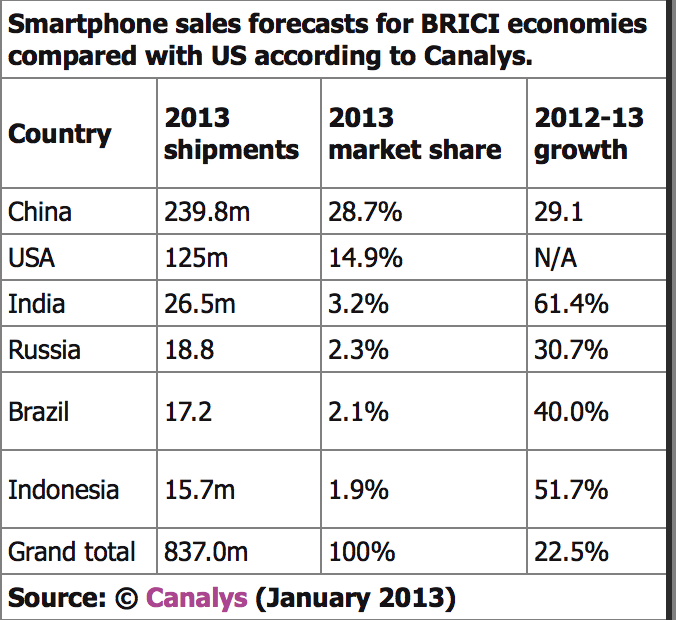Nokia has fallen. Not even the name will remain. America’s victory in the smartphone wars is complete — for now.

Last week’s news from the front lines of the smartphone wars illuminates the scope of America’s rapid mobile ascendency.
From Microsoft:
“Microsoft acquires Nokia’s smartphone and mobile phone businesses, its design team, most of its manufacturing and assembly facilities and operations, and sales and marketing support.”
From Facebook:
Mobile active users are 1.01 billion as of March 31, 2014, an increase of 34% year-over-year.
From Apple:
“We sold almost 44 million iPhones, setting a new March-quarter record.”
And the week before, from Google:
Q1 2014 earnings totaled $15.4 billion in revenue, a 19% increase over the previous year’s $12.95 billion. Oh, and their Android platform is on nearly 80% of every smartphone in the world.
Designed By Apple And Google And Microsoft In America
iOS, Android and Windows Phone – American designed, American-led operating platforms all – account for nearly 98% of the global smartphone market, a truly stunning statistic. There appears no line on the horizon.
As the world rushes to replace their mobile phones with smartphones, even Microsoft, now a distant third, is well positioned to fully capitalize on mobile. Their takeover of Nokia includes the company’s very popular Asha brand of hybrid smartphones/featurephones, as well as Nokia’s traditional handset business, which still ships more than 200 million devices a year. (Second only to Samsung)
Should America celebrate these results?
Yes.
Should the rest of the world take bold, perhaps costly action to limit the continued rise of America’s mobile dominance?
Probably they should try.
The Pivot To Mobile
How did America so convincingly win the smartphone wars? First and foremost by attracting, developing, retaining, and fully incentivizing the best and brightest.
Vision and execution are also paramount. Consider:
- Apple’s relentless pursuit of optimizing hardware while simultaneously improving upon and expanding the modes of interaction with that hardware.
- Google encourages, captures and then attempts to make sense of (and profit from) the multiple data streams we generate.
- Facebook seeks to connect the world on a fully human level.
- Microsoft has spent the past four decades making computer applications more empowering and productive.
Also, and despite their vast size, these companies move with speed. Witness Facebook’s head-turning pivot to mobile. I think Mark Zuckerberg should be hailed for this accomplishment.
Weaknesses Along The Front Lines
Are there weaknesses in America’s smartphone leadership? Several, in fact.
Apple
iTunes is the center of Apple. It’s what locks us in, it’s what helps lure new customers. iTunes revenues are falling on a per-user basis. If iTunes spending falls on a per-user basis, I believe hardware margins will follow suit. Apple is optimized for hardware margins. The iTunes trend line thus appears ominous.
Google still does not have an effective messaging strategy. This is confounding. There may be no more important mini-platform in the near term than messaging. Facebook, of course, battered its way into this critical market, dropping $20 billion on Instagram and WhatsApp in a single year. Google will almost certainly need to do the same. Larry Page has the wherewithal to follow suit — does he have the necessary humility? I am not convinced.
Google’s primary response to date, requiring SMS and messaging to default to Google’s Hangouts service, seems a rather anemic response.
Though it claims over a billion mobile users, Facebook has no smartphone platform. This perpetually locks them out from critical user, usage and location data. That Facebook is now looking to buy its way into the wearables market, which potentially delivers incredible amounts of user data, should be no surprise.
That said, what will Mark Zuckerberg do when the ‘monopoly’ money runs out? Successful businesses aren’t sustained on buying up others’ creations.
Microsoft
Despite the well reviewed Windows Phone 8.1 OS, Microsoft has yet to reveal it can create a thriving mobile-first business.
Manufacturing
Microsoft’s purchase of Nokia notwithstanding, the vast majority of manufacturing of every piece of smartphone hardware is outsourced. The case has been made that regular interaction with new materials and new manufacturing processes will lead to those companies (and nations) becoming the primary source of innovation, thus trumping Apple, Google et al. This idea has not been borne out and I suspect it never will. Shedding our manufacturing abilities has no doubt damaged America’s middle class, but not its technology leadership.
Money and the Snowden factor
Smartphone platforms almost certainly contribute to a nation’s economic well-being and security. Smartphones link people, telecommunications and banking, holds our most personal information, tracks our movements, manages our identity, logs our purchases, connects us to first responders, and provides vital access to news, cultural and learning resources. We have to assume larger nations in particular are keenly incentivized to repel America’s technological reach. This is especially true in a post-Edward Snowden environment.
It’s not simply a matter of geopolitics, of course. Real money is at stake. Google and Facebook are effectively banned in China — and the in-country alternatives are now worth billions.
Over 90 million smartphones sell in China every quarter. China may decide to lock out Apple and Microsoft — or demand unreasonable ‘rents’. If China creates barriers to Apple, for example, or perhaps does all it can to promote or subsidize homegrown companies such as Xiaomi, then certainly Apple’s growth potential will be diminished.
I would also not be surprised if government sponsored firms in India or Indonesia, for example, purchase BlackBerry or commit significant resources to improving the open source version of Android (AOSP), which is free of all Google services. Success by any means necessary.
Why This Matters
Smartphones are the next great phase in computing’s decades long remaking of work, play, learning, commerce, creativity and connectivity around the planet. They connect us with nearly everything. America is in the lead now. Americans may wish to celebrate this. To remain at the top, however, will demand vigilance, daring and vision.
Each phase of the computing revolution appears to come faster than the one before. The smartphone wars will soon be the technology revolution of the past.





“This perpetually locks them out from critical user, usage and location data.”
If we correctly object to the NSA doing these things, why are we okay with non-governmental bodies doing them? This is only partially eased by the fact that they are voluntary. Since all these things rely on EULA’s (unilateral contracts) then it’s like signing a contract without the benefit of an attorney.
Glad you brought up the Snowden factor after that.
I did not object.
I assume you mean objecting to the NSA. I did not mean YOU object, I said WE (a significant number of people) object. 🙂
The same can be said of the computer industry – Intel or AMD design and make the heart of the PCs. Everything runs an OS designed and created in the US – Windows, OSX, Unix, Linux you name it. Other countries have only become manufacturing houses for American technology to reduce costs. HP, Dell etc ruled the world for sometime before the Taiwanese and Chinese vendors caught up with them. Still none of them can start something globally and dominate. The only non-US company I can think of is Sony which brought out its own creations and innovations to the world market. Now Sony is past its prime. The same goes for database – Oracle dominates. And now Mobile business has been created and propagated by American companies. It is no surprise. The US has the infrastructure to encourage creativity and out of the box thinkers. College dropouts can form global companies and change the way everything works. Google, eBay, Travel deal companies, Social media companies only started in the US first. Others are still mimicking and cannot change the world by themselves.
I think it’s a testament to America’s tech sector, in particular. As mentioned briefly above, the shift to mobile changed practically everything — and it could have been anyone’s to win. That America won is to be celebrated (in my view).
Successful businesses aren’t sustained on buying up others’ creations.
It has kept Microsoft going for decades, since the day they bought QDOS and renamed it PC-DOS for use on the original IBM PC, and renamed MS-DOS for all the IBM clones. PowerPoint also was purchased. IIRC, other Office components and major MS products were also purchased.
It wasn’t buying up QDOS or Powerpoint that turned them into a giant. It’s what they did with them over the years.
You’re conveniently missing (or ignoring) the fact that whilst iTunes revenue may be falling on a per-user basis, over the period stated, the number of users has increased almost four-fold:-
http://www.asymco.com/wp-content/uploads/2014/04/Screen-Shot-2014-04-29-at-4-29-11.25.29-AM.png
So, not quite the disaster you’re suggesting. Also:-
“If iTunes spending falls on a per-user basis, I believe hardware margins will follow suit…”
Why? And if so, what difference would that make if, like iTunes, they’re growing their hardware user base?
I did no such thing. I laud Apple’s global ascendency. But, as a potential threat, less spend per user may mean reduced margins. As Apple is currently optimized for high margins, this is a potential threat I had to address.
Superb post however I was wanting to know if you could write a litte more on this topic? I’d be very grateful if you could elaborate a little bit more.
Great post Thank you. I look forward to the continuation.
very satisfying in terms of information thank you very much.